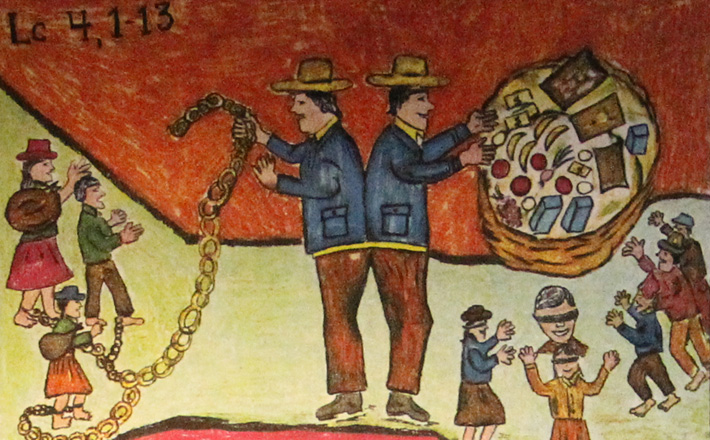Commentary on Romans 10:8b-13
I was recently away from my family for over a week, and the family photo that is on my computer desktop was a constant companion.
But the photo is only a shadow that anticipated the reality I experienced when I got home. It would be strange indeed to greet my husband and kids on my return, power up my computer, and talk about how much I love this photo. When my husband and boys are near and accessible, all I want to do is gaze at them, hug them, and talk with them.
Our text is part of a larger argument in which Paul makes a contrast between gazing at the shadow of the law and recognizing Christ as the reality it anticipated.
Paul has been discussing Israel’s unbelief. He writes that Israel was ignorant of God’s righteousness and so sought to establish their own righteousness by keeping the law (Romans 9:30-10:4). They continued to gaze at the law itself and missed the Christ, God’s revelation of righteousness. Paul sums it up this way: “Christ is the end of the law for righteousness to all who believe” (10:4).
Romans 10:8b-13 is part of Paul’s explanation of this statement in verse 4. Paul explains it by quoting the Torah to show the relationship between “the righteousness that comes from the law” (verse 5) and “the righteousness that comes from faith” (verses 6-13). His main purpose is to demonstrate by means of the law itself that it had its goal in Christ all along.
Those who gazed at the shadow insisted that a person could gain righteousness, or a right status before God, by keeping the law. Paul quotes Leviticus 18:5 (Romans 10:5) as representative of “the righteousness that comes from the law,” perhaps because it appears to support the approach of his opponents. But then he uses another part of the Torah to demonstrate the reality that the shadow anticipated.
Paul puts Deuteronomy 30:12-14 in the mouth of the personified “righteousness of faith” and applied it creatively to the redemptive work of Christ in his incarnation and resurrection/exaltation (Romans 10:6-8a). Just as the law was God’s gracious gift, bringing the redemptive work of God near and accessible to human beings, so Jesus Christ is God’s ultimate gift, bringing God’s redemptive work near and accessible to human beings in climactic way. For anyone to cling to the Mosaic law as its own purpose and goal is to miss what God has done in Christ.
The larger context of Deuteronomy 30 is instructive. It speaks of the restoration of Israel’s fortunes after they have experienced the curses of the covenant and, ultimately, exile because of their failure to keep the law. This text anticipates the day when the people and their descendants will return to God, who will circumcise their hearts so that they may “love him with all your heart and with all your soul, and live” (30:6). This promise fits the message of the prophets that God will establish a new covenant with his people by which he will circumcise their hearts and write his law upon them (Jeremiah 31:31-34). The point is that the life promised by the law (Leviticus 18:5) is finally accomplished by the redemptive work of God (Deuteronomy 30).
Now we may look at our text fruitfully. Paul writes that his use of Deuteronomy 30:12-14 in Romans 10:6-8 may be summed up as “the word of faith that we proclaim” (10:8b). Verse 8b works like a hinge: it summarizes verses 6-8a, and it is unpacked in verses 9-13. Verses 9-10 contain parallel statements, “confess with your lips, believe in your heart… one believes with the heart, confesses with the mouth.” This language and order are dictated by the quotation of Deuteronomy 30:14 in Romans 10:8a: “The word is near you, on your lips and in your heart.”
Paul expands upon the nearness and accessibility of God’s redemption in Christ by expressing the ease and extent of its application. The ease of God’s redemption is that people are justified (made righteous, given right standing) not by keeping the law, but by faith. The extent of God’s redemption is that this expression of faith apart from the law makes salvation accessible to both Jew and Gentile (verses 11-12; see also 3:22-24).
The confession that “Jesus is Lord” is a declaration that God is doing something new for Israel and for the whole world. Israel had made the confession, “Hear, O Israel: The Lord is our God, the Lord alone” (Deuteronomy 6:5). The confession that “Jesus is Lord” not only expresses that Jesus Christ the end of the Law, but also that Jesus Christ is the very God who saves (see also Acts 22:16; Philippians 2:11; 1 Corinthians 12:3; 2 Corinthians 4:5). Paul uses Joel 2:32 in order to drive home the point that Jesus Christ is the Lord of which Joel spoke, “Everyone who calls on the name of the Lord shall be saved.”
God continues to do something new in our lives and in our churches. Sometimes, however, we get stuck in the past, wistfully clinging to shadows. Perhaps we may find an opportunity during the meditations of this Lenten season to gaze at Jesus Christ.


February 17, 2013